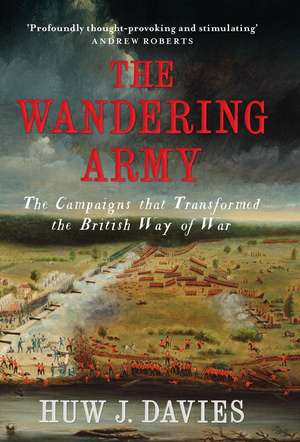The Wandering Army: The Campaigns that Transformed the British Way of War
Autor Huw J. Daviesen Limba Engleză Hardback – 13 dec 2022
“Superb analysis.”—William Anthony Hay, Wall Street Journal
At the outbreak of the War of Austrian Succession in 1742, the British Army’s military tactics were tired and outdated, stultified after three decades of peace. The army’s leadership was conservative, resistant to change, and unable to match new military techniques developing on the continent. Losses were cataclysmic and the force was in dire need of modernization—both in terms of strategy and in leadership and technology.
In this wide-ranging and highly original account, Huw J. Davies traces the British Army’s accumulation of military knowledge across the following century. An essentially global force, British armies and soldiers continually gleaned and synthesized strategy from war zones the world over: from Europe to the Americas, Africa, and Asia. Davies records how the army and its officers put this globally acquired knowledge to use, exchanging information and developing into a remarkable vehicle of innovation—leading to the pinnacle of its military prowess in the nineteenth century.
Preț: 197.25 lei
Nou
Puncte Express: 296
Preț estimativ în valută:
37.74€ • 39.33$ • 31.25£
37.74€ • 39.33$ • 31.25£
Carte disponibilă
Livrare economică 14-28 martie
Livrare express 27 februarie-05 martie pentru 42.25 lei
Preluare comenzi: 021 569.72.76
Specificații
ISBN-13: 9780300217162
ISBN-10: 0300217161
Pagini: 384
Ilustrații: 32 color illus.
Dimensiuni: 152 x 235 x 45 mm
Greutate: 0.84 kg
Editura: Yale University Press
Colecția Yale University Press
ISBN-10: 0300217161
Pagini: 384
Ilustrații: 32 color illus.
Dimensiuni: 152 x 235 x 45 mm
Greutate: 0.84 kg
Editura: Yale University Press
Colecția Yale University Press
Recenzii
“Mr. Davies’s superb analysis, though centering on the British experience, implicitly raises broader concerns. How, during peacetime, can armies and the civilian authorities overseeing them avoid the errors of groupthink and sustain military capabilities? It is a perennial question to which . . . there is no easy answer.”—William Anthony Hay, Wall Street Journal
“Vigorously argued, this intriguing thesis rests on wide-ranging research among the extensive secondary literature and archival sources.”—Stephanie Brumwell, Times Literary Supplement
The Templer Medal was established by The Society for Army Historical Research in 1981 to commemorate the life and achievements of Field Marshal Sir Gerald Templer KG (1898-1979) (pictured) and to mark his Presidency of the Society between 1965 and 1979.
The medal is awarded annually to the author of the book published during that year that has made the most significant contribution to the history of the British Army.
Winner of the 2022 SAHR Templer Medal
“In this wide ranging and important study, Huw Davies assesses an improvement in military proficiency that was highly significant for global as well as British history. It deserves considerable attention.”—Jeremy Black, author of Military Strategy
“An eminently readable book, offering an important new perspective on Britain’s military leadership and warfare strategies in a period of significant change. Davies gives us a rare front-row seat at mess tables, desks, and command tents of eighteenth-century army personnel around the globe.”—Jennine Hurl-Eamon, author of Marriage and the British Army in the Long Eighteenth Century
“This well-researched, well-written and profoundly thought-provoking and stimulating book will force us to reappraise the whole area of the British Army’s evolution from the eve of the Seven Years’ War to that of the Crimean War.”—Andrew Roberts, author of Napoleon: A Life
“An important exploration of how formal and informal networks shaped knowledge exchange and institutional learning during the British military enlightenment of the mid-18th century. Davies has brought together an impressive expanse of archival research in order to show how the British army learned and adapted in its first series of global imperial wars.”— Anna Brinkman-Schwartz, King’s College London
“Vigorously argued, this intriguing thesis rests on wide-ranging research among the extensive secondary literature and archival sources.”—Stephanie Brumwell, Times Literary Supplement
The Templer Medal was established by The Society for Army Historical Research in 1981 to commemorate the life and achievements of Field Marshal Sir Gerald Templer KG (1898-1979) (pictured) and to mark his Presidency of the Society between 1965 and 1979.
The medal is awarded annually to the author of the book published during that year that has made the most significant contribution to the history of the British Army.
Winner of the 2022 SAHR Templer Medal
“In this wide ranging and important study, Huw Davies assesses an improvement in military proficiency that was highly significant for global as well as British history. It deserves considerable attention.”—Jeremy Black, author of Military Strategy
“An eminently readable book, offering an important new perspective on Britain’s military leadership and warfare strategies in a period of significant change. Davies gives us a rare front-row seat at mess tables, desks, and command tents of eighteenth-century army personnel around the globe.”—Jennine Hurl-Eamon, author of Marriage and the British Army in the Long Eighteenth Century
“This well-researched, well-written and profoundly thought-provoking and stimulating book will force us to reappraise the whole area of the British Army’s evolution from the eve of the Seven Years’ War to that of the Crimean War.”—Andrew Roberts, author of Napoleon: A Life
“An important exploration of how formal and informal networks shaped knowledge exchange and institutional learning during the British military enlightenment of the mid-18th century. Davies has brought together an impressive expanse of archival research in order to show how the British army learned and adapted in its first series of global imperial wars.”— Anna Brinkman-Schwartz, King’s College London
Notă biografică
Huw J. Davies is reader in early modern military history at King’s College, London. He is the author of Wellington’s Wars: The Making of a Military Genius and Spying for Wellington: British Military Intelligence in the Peninsular War.
Descriere
A compelling history of the British Army in the eighteenth and nineteenth centuries—showing how the military gathered knowledge from campaigns across the globe
